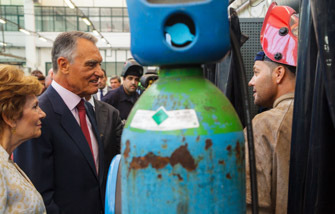
The Porto University Precinct of Science and Technology, known in short as UPTEC, is a common area for scientists and researchers. Above all else, however, it is a notable example of the culture that emerges from the constant relationship between university and business activities.
The connection to the scientific community, the set of conditions that support researchers to transform their results into entrepreneurial projects, the cooperation environment amongst scientists are factors that contribute towards the recognized success of this project.
But the existence of a long term vision is equally what caused Porto University to become, through this Science and Technology Centre, an active player in the field of enterprising initiative and in the transfer of knowledge to the economy.
The nature of a University always contains an area of freedom, of search for the truth, independence and creativity. But, as a social institution, the Academy cannot dispossess itself from its environment, cannot avoid questioning itself concerning its contribution to society
Portugal is a unique case in Europe of progress, in a short period of time, in issues of science and technology.
Portuguese universities and our researchers run shoulder to shoulder with their international peers in many areas of knowledge.
Public financing was decisive to obtain this success. Without it, the results we are celebrating today could never have been reached.
It happens, however, that this evolution was not mirrored in the specialization profile of the national economy, which continues mainly based in sectors of low and medium technological intensity.
The activity and production of knowledge of the scientific community continue having little influence in the life of the majority of national enterprises.
We have to view the scientific and technological infrastructure as an investment, with respect to which it is however only fair to expect a given return.
We know that the greatest incentive for researchers is the publication of their findings in internationally recognized magazines, and that their practical application is somehow trivial. Thus the transfer of knowledge could become a secondary item in the priorities of many university researchers.
In order that the university has a greater influence in the economy, it would be necessary to encourage its agents through a system of incentives that direct the Academy towards becoming an increasingly active player in the creation of national wealth. It is true that the University must search for knowledge without becoming an agent of corporate interests. However, an ethical symmetry must be found between theoretical knowledge and the academic contribution to the community.
We thus need to significantly evaluate applied research, both in the progress of the academic career, in the areas considered as relevant, and as a criterion for the public financing of the universities.
This, I repeat, does not mean diminishing the role of universities in the system of innovation, but it’s strengthening in the entrepreneurial context.
The increased liaison of the University to companies can generate new technologically based productive units, in which the researcher should himself assume an enterprising role
This is the case with many of the start-ups I have contacted, developed within an university context and set up by scientists and researchers.
On another hand, the relationship between universities and companies in the field of innovation could be strengthened by companies employing researchers in their staff.
The increase in the added value of national production, essential for our collective future, must take place by way of a greater technological intensity in the sectors where the country is competitive.
The way in which the University is related with the entrepreneurial fabric is thus particularly relevant. It is important that the knowledge produced in university centres reaches our companies, generating wealth and creating employment.
Ladies and Gentlemen,
UPTEC is a good example of the value of the knowledge produced in a university environment in areas of great economic potential. Outstanding amongst such areas are the new technologies, the economy of the sea, creative industries and biotechnology.
UPTEC has anyway been recognized as one of the best company incubators in Europe, where applied research travels its course, from the laboratories to the markets.
The entrepreneurial projects that I have visited here are the result of a healthy proximity between the academy and the economy and clearly demonstrate the possibility of valuing knowledge and creating employment in sectors with large technological intensity and high added value.
I thus wanted to congratulate the UPTEC management team, represented by its President, Professor Novais Barbosa.
I also want to voice my recognition for the work developed by the Chancellorship of Porto University, which will shortly terminate its term of office. The success of UPTEC is also the result of a strategic vision as to the University’s contribution towards the country’s development.
To you all, scientists, researchers, students, lecturers and entrepreneurs, my best thanks.
I am very grateful for your talent and your work.
Professor José Carlos Marques dos Santos will shortly complete his term as Chancellor of Porto University, an office he performed with recognized competence over 8 years.
Before this he had already served the Country with great distinction as director of the Faculty of Engineering.
As Chancellor his contribution was decisive for the international recognition of Porto University.
The Science and Technology Park is an evident result of his work as well as the connection with the corporate world and with the creation and development of UPTEC.
As a public recognition of the relevant services performed to the University and to the Country I have decided to award him the Grand Cross of the Order of Public Education, and am very honoured to bestow upon him the respective insignia.
© 2006-2016 Presidency of the Portuguese Republic
You have gained access to the records of the Official Site of the Presidency of the Republic from 9 March 2006 to 9 March 2016.
The contents available here were entered in the site during the 10 year period covering the two mandates of President of the Republic Aníbal Cavaco Silva.